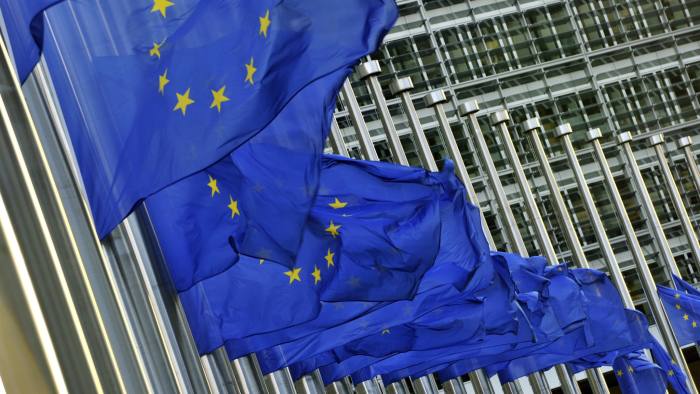The economic cost of fraying trust in Europe
Mutual suspicion among EU member states threatens to unravel inter-dependence
Martin Sandbu

© AFP
The EU is often rightly described as an international legal order. But its formidable legalism makes it easy to lose sight of another, equally profound aspect of the European project: the decades-long cultivation of trust between its members. Quite apart from challenges to the rule of law, the withering of that trust threatens to debilitate Europe — politically, of course, but economically as well.
Take the case of Lyudmyla Kozlovska, a Ukrainian political activist who was refused entry and deported from the EU at Brussels airport last month. Ms Kozlovska had attracted the ire of Poland’s government for the work of a rights organisation she set up and runs with her Polish husband in Warsaw. While on a trip to Ukraine she was banned from returning home and put on a blacklist in the Schengen Information System. In this way, the Polish government committed all the members of Europe’s borderless travel area — including those Belgian border guards — to excluding her from their territory.
Warsaw claims irregularities in the funding of Ms Kozlovska’s non-governmental organisation. Even if true, this seems far below the threshold of seriousness that would justify an activist’s expulsion from most of Europe at one government’s say so. The more plausible motive is in response to a Facebook post last year by her husband that called for peaceful civil disobedience against the Polish government’s crackdown on independent institutions.
Warsaw now faces deep suspicion that it has used a mechanism designed to protect national security to punish an irritating democracy activist. In defiance of the Polish move, Germany issued Ms Kozlovska with a short-term visa last week so she could address legislators in the Bundestag. This is an extraordinary series of events. The Schengen treaty was a trailblazing step in international governance. Doing away with border controls (in normal times) required an unprecedented degree of solidarity and trust that other countries would treat each member’s security as seriously as its own. The Kozlovska case shows how fragile this is. Once the interdependence built into the Schengen Agreement is seen as exploitable for domestic politics, its long-term sustainability is surely in question.
This is about more than Ms Kozlovska, and hits at the political foundation of the Schengen accord. It goes beyond it too. Once you start looking, the whole fabric of European co-operation relies not just on common legislation but on shared expectations of how members use the powers that remain in their hands.
Weak control of money laundering in Latvia and Estonia (as well as more established financial centres) undermines the integrity of the entire European banking system. Malta’s liberal granting of citizenship is an oligarch’s fast-track to the rights and freedoms afforded by the EU as a whole. Disenchantment with eurozone countries’ budget policies has meant the bloc’s fiscal rules have fallen into disrepute, even as they have been made ever more detailed. These and many other examples involve member states not so much breaking the law as applying it or interpreting it in ways that flout shared European interests.
That distrust makes it harder for EU countries to unite politically is obvious. The economic damage is less apparent, but just as grave. Europe’s economic strength depends not only on the legal order of its internal market and compliance with its formal rules. It also depends on the degree of trust between its participants.
Trust makes for better laws. It is easier to make the trade-offs necessary for broad prosperity and growth with shared confidence that nobody is taking undue advantage of others. Those who trust one another will more often comply voluntarily with common rules, requiring fewer resources for monitoring and enforcement.
But trust also economises on the need for codes, contracts and lawyering in the first place. Economies with a high degree of mutual trust enjoy the tremendous advantage of not having to codify the terms of economic activity excessively. Trust ensures that any legal or contractual gaps are filled by a shared understanding of how things should be done and a willingness to act on that understanding. The predictability this creates is a huge economic asset.
One substitute for lost trust is more detailed legislation. (Independent legal analysis now argues the Belgians should have questioned the reasons behind Ms Kozlovska’s blacklisting before acting on it; no doubt litigation and jurisprudence will follow.) But laws and contracts cannot cover all the cracks of undefinable events as well as trust can. In any case the loss of trust limits how much law can be passed to take its place.
If stricter rules cannot defuse a sense that common institutions are being unfairly exploited, the logical reaction will be a push to roll back mutual interdependence. Abusing the trust that smooths economic activity across Europe is short-sighted in the extreme. It will lead either to more centralised lawmaking, or to the slow disintegration of cross-border economic links.
Smaller, less developed countries, with a weaker base of domestic trust to start on, would suffer most from such a future. It would be a tragedy if the newer member states, which gained the most from joining a European ecosystem of trust, were the ones who blighted it.
0 comments:
Publicar un comentario